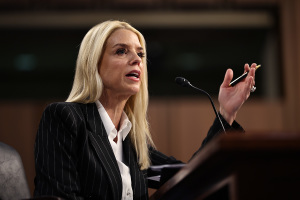'Tea Party Downgrade' a Problem, Say Democrats
The Tea Party has taken its share of shots recently and now Democrats are taking aim at the movement for the downgrading of U.S. credit.
“The fact of the matter is that this is essentially a Tea Party downgrade,” said Obama adviser David Axelrod on CBS’ “Face the Nation.” “The Tea Party brought us to the brink of a default.”
But it wasn’t the nation's credit downgrade alone that brought criticism on the Tea Party movement. Democrat leaders from President Obama to Sen. Harry Reid (D-Nev.) have been hammering on the movement for the past several months.
Reid told reporters last week that he and his colleagues are worried about the “Tea Party direction of this Congress.”
Rep. Steve Israel (D-N.Y.), chairman of the Democratic Congressional Campaign Committee, picked up the pace over the weekend by saying that the “Roadblock Republicans” forced House Speaker John Boehner to side-step a deal with President Obama that would have prevented the downgrade.
Former Arkansas Governor and now Fox News commentator Mike Huckabee said all the noise from Democrats was simply them reading from the same “talking points.”
“When you hear these words over and over, these are not the words of people who are creative enough to come up with their own talking points,” Huckabee told Fox News. “These are people who are reading from a script. And it frustrates me that you’ve got people elected to high positions who can’t even come up with their own phrasing, for heaven’s sake.”
Republicans also maintain that Standard & Poor’s (S&P) decision was in large part due to the country’s failure to adequately tackle its debt problem – the primary reason why the Tea Party movement was formed in the first place.
Sen. Jim DeMint (R-S.C.), a fiscal conservative and strong advocate of the Tea Party, said the downgrade strengthened his position that America needs fiscal restraint. “The deal was not a serious attempt to solve our spending and debt problem – it was a political solution meant to kick the can down the road,” he told reporters.
John Chambers, S&P’s managing director, said there is “lots of blame to go around.” He agreed that the current environment in Washington is dysfunctional,” but also added a major factor was the nation’s “fiscal trajectory.”
“The fiscal situation in the United States is not sustainable,” Chambers told Fox News.
Additionally, Republicans have hit Treasury Secretary Timothy Geithner for being unprepared in not having a proposal to grow the economy and have repeatedly called for him to step down. However, on Friday Geithner informed Obama that he would remain in his position for the foreseeable future.
Yet on the other side of the coin, some financial analysts are saying the Tea Party now has even more of a reason to stick their chest out.
“Clearly the ratings downgrade was a ‘political decision’ in the sense that the politics explained the timing of this, because the numbers have been irrefutable for a decade,” Robert Litan, vice president for research and policy at Kauffman Foundation in Kansas City told Bloomberg. “It gives an enormous amount of ammunition to the Tea Party.”





























